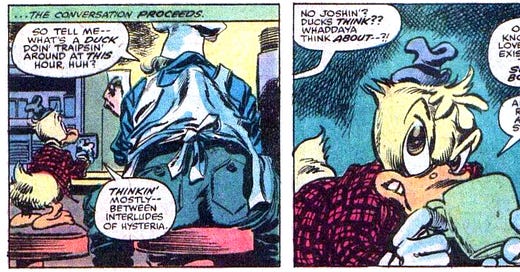Book: Howard the Duck
Issue No.: 24
Published: February 21, 1978
Title: “The Night After You Save the Universe”
Cover Price: 35¢
OK, just based on the title of this one, apparently I’m starting this book one issue after the issue where Howard the Duck saved the universe? Whoa.
But before I get into the story, let me mention the writer of this book, Steve Gerber. I didn’t read Howard the Duck as a kid, but I did love Thundarr the Barbarian, a Saturday morning cartoon about a post-apocalyptic barbarian that was ostensibly made to cash in on the sci-fi craze that Star Wars kicked off in 1977. Even watching Thundarr today, it is cooler and weirder than most Saturday morning kiddie fare, and over the years I’ve learned that Steve Gerber, one of the show’s main creators, is a big reason why. It also doesn’t hurt that Jack “King” Kirby worked on Thundarr. So anyway, even though I haven’t read a lot of Gerber comic books, I’m going into this one already a fan of his work.
Artwork for this issue is by the great Gene Colan. I like how the lead character is a talking duck, not visually that different from Donald or Daffy, but Colan plays it totally straight, drawing Howard the Duck with the same realistic (or at least non-cartoony) style he uses on the Tomb of Dracula book.
We find out on the splash page that Howard the Duck (who I think is an alien from a world populated by intelligent talking ducks) and his allies (including a barbarian and the muck monster known as Man-Thing) recently stopped someone named Bzzk’Joh (not a typo) from destroying the universe.
I picked out this book hoping for something fun after reading a melancholy Captain Marvel story. The joke’s on me because, if anything, this talking animal comic book is more melancholy than the cosmic superhero book. It’s kind of an After Hours sort of story, with Howard wandering the city and getting into a few late-night misadventures while he struggles with an existential crisis. I expect if I had read this in February of 1978 I would have come away confused — this book might be approved by the CCA, but it’s not a kids’ book.
For example, there’s a nice little meta moment where an apparently homeless woman tells Howard that she used to teach English lit and knows that she is symbolically significant to his story and integral to his story’s thematic structure. I gotta imagine that went over the heads of a lot of seven-year-olds in ’78.
All that said, as a melancholy guy in his 50s, I love this story — this issue of Howard reads a lot more like an indie ’90s comic book than a mass-market 1970s book from a big capes-and-tights publisher.
Next time — On a continuing quest for something less melancholy, I’ll turn once again to our friendly neighborhood Spider-Man.



